Killanin in the Eye of the Storm
How Lord Killanin is playing for time in an effort to outwit Jimmy Carter and Margaret Thatcher.
In the early hours of Sunday, January 27, the telephone lines were crackling between Colorado and a discreet Georgian residence in Dublin's Lansdowne Road. An animated conversation was going on between the President of the International Olympic Committee, Irishman Lord Killanin, and the head of the United States Olympic Committee, Robert Kane, in an attempt to head off the threat to the Moscow Olympics caused by President Carter's call for a boycott.
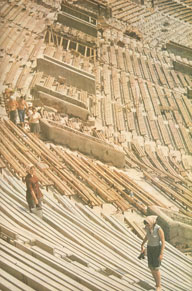 A cleverly worded statement by the USOC carefully avoided a call for a boycott of the games and asked the IOC instead for the games to be postponed, cancelled or removed from Moscow - no indication was given what the USOC response would be in the event of the IOC refusing this request. For the fact is that the IOC is certain to turn down this request when it meets in Lake Placid, New York state in the second week of February. Firm contracts have been signed with the organising committee in Moscow and nothing has been done by the Soviet authorities in breach of that contract - the invasion of Afghanistan is irrelevant.
A cleverly worded statement by the USOC carefully avoided a call for a boycott of the games and asked the IOC instead for the games to be postponed, cancelled or removed from Moscow - no indication was given what the USOC response would be in the event of the IOC refusing this request. For the fact is that the IOC is certain to turn down this request when it meets in Lake Placid, New York state in the second week of February. Firm contracts have been signed with the organising committee in Moscow and nothing has been done by the Soviet authorities in breach of that contract - the invasion of Afghanistan is irrelevant.
Killanin and the senior members of the USOC are hoping that by the time that the deadline for acceptance of invitations to the games expires on May I 7, the political temperature in the United States will have cooled sufficiently to permit the US athletes to go to Moscow without Presidential hindrance or public disapproval.
Killanin and the other JOC officials are declining all press and TV interviews until the Lake Placid meeting but it is apparent that messages of support for the games have streamed into the IOC head office in Lausanne, Switzerland, and relayed from there to the office in the basement of the IOC President's flat in Dublin.
Outside the United States, the greatest political opposition to the games has come from Britain where Mrs. Thatcher has enthusiastically called for support for President Carter's proposed boycott. However her manner of handling the issue has alienated most of the athletes and sports bodies involved - none of them was consulted either before the boycott call was made or before the suggestion to offer alternative sites in Britain was proferred. This latter idea has evoked ridicule from most of the British sporting world - in the first place there was annoyance that at a time when the sports council's grant was being cut the Government could find the money to offer £8 million to support an alternative Olympics; then the transparent inadequacy of most of the facilities involved was overlooked; and finally the Government was so inadequately informed on the issue that they were talking of facilities for badminton which isn't even an Olympic sport.
Although Sebastian Coe spoke of the political dimension to the games which couldn't be overlooked, it was apparent that he would be among the competitors at Moscow, irrespective of the stance taken by the British Government, as would the vast majority of eligible British athletes. Incidentally, the situation is not helped either in Britain or the United States by the size of contracts that have been negotiated between newspapers and individual athletes who are expected to supply copy when caned upon.
National Sports Federations throughout the world have indicated their support for the games as have almost all the national Olympic committees. Thus it is expected that in the other countries where there is strong. political opposition to the games, such as Australia, the athletes will participate in the games. The sole question mark hangs over the United States.
The fact - i.e. that the United States could be almost alone in staging a boycott - could itself he a factor in
the decision of American athletes to attend. Other factors could include the future of the 1984 games scheduled to take place in Los Angeles. There is no indication from the IOC on what retaliatory action there might be if the Americans stay away from Moscow. Lord Killanin seemed to suggest in a statement, shortly after President Carter's TV call for a boycott, that there would be repercussions. He said: "it is not compulsory for any national Olympic committee to accept invitations to take part in the Olympic Games, not for any individual athlete to compete for any national Olympic Committee. "
However there were other suggestions emanating from within the IOC that if the USOC cal1ed for a boycott, it would be in breach of the contract for the Los Angeles Olympics and that therefore those 1984 games might be moved elsewhere. There is also a great deal of confusion of who will pick up the tab for the television contracts that have been signed with the IOC and the Moscow authorities. America's NBC network paid for the rights to televise the games to the United States but they have indicated since that if American athletes are not going to take part they won't give the television coverage.
The crunch in relation to the Moscow games will come first at the meeting of the IOC executive committee in Lake Placid this month. There Robert Kane, the USOC President and Don Miller, the USOC executive director, will report on their meeting with President Carter and will make their case for a removal of the games from Moscow, their postponement or cancellation. But the real point of that meeting will be to try to find a compromise which will let the American athletes off the political hook on which President Carter has strung them. More than likely the strategy will be to play for further time and keep options open right up to the closing dates for acceptance of the invitations.
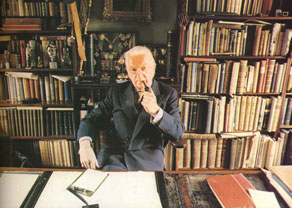 Lord Killanin is scheduled to make a speech at the opening of the winter games at Lake Placid, along with Robert Kane and Governor Hugh Carey of New York state - Kane and Carey are Irish Americans and thus Irishmen will monopolise the centre of the world's sporting stage and indeed political as well for that occasion. Killanin's speech is expected to reiterate the credo of the Olympic movement, independent of political considerations, dedicated to excel1ence in sport. It will be his most delicate moment -since he took up the IOC Presidency in 1972 but a task for which his record suggests he is remarkably suited.
Lord Killanin is scheduled to make a speech at the opening of the winter games at Lake Placid, along with Robert Kane and Governor Hugh Carey of New York state - Kane and Carey are Irish Americans and thus Irishmen will monopolise the centre of the world's sporting stage and indeed political as well for that occasion. Killanin's speech is expected to reiterate the credo of the Olympic movement, independent of political considerations, dedicated to excel1ence in sport. It will be his most delicate moment -since he took up the IOC Presidency in 1972 but a task for which his record suggests he is remarkably suited.
Lord Killanin was born on July 30, 1914. His father, Lieut. Col. the Hon. George Morris, was in the Irish Guards and his mother was from Melbourne, Australia. He was educated at Eton, the Sorbonne and Magdale College, Cambridge, where he boxed and rowed and becaine President of the Footlights Dramatic Club.
On leaving Cambridge he joined the London Daily Express from which he was fired for inaccurate reporting. He quickly got a job however with The Daily Mail and quickly made his mark as an outstanding war correspondent he reported the Chinese/Japanese war in 1937/1938. He returned to become assistant political and diplomatic correspondent of the paper and also wrote a political column for The Sunday Despatch.
In 1939 he volunteered and served throughout the war in the Kings Royal Rifle Corps, taking part in the invasion of Normandy for which he was made a member of the Order of the British Empire.
On demobilisation he returned to Ireland where he had spent his childhood and had rebuilt the family home at Spiddal, Co. Galway - he had inherited the peerage and the home when his uncle died in 1927. The home had been burnt down in the civil war in 1923. Although his entire formation was English, Killanin is aggressively Irish in his public stances. He strongly identified with the anti-partition campaign of the first coalition government from 1948 to 1951. He was involved in the setting up of Clan na Poblachta and has always been close to Sean McBride.
He is one of the very few resident Irish southern peers still entitled to sit in the House of Lords. The family peerage is a United Kingdom one, which was given to his great grandfather who was the first Catholic to be appointed Attorney General.
He got deeply involved in the film business in the fifties, being associated with John Ford in the making of The Quiet Man. He was also involved in the production of The Rising of the Moon, The Playboy of the Western World and Gideon's Day. He edited and contributed to a book on the Munich crisis, he was co-author of A Shell Guide to Ireland.
He is a member of the board of 13 Irish companies and is chairman of eight of them. He is a member of four state and charitable bodies of the Irish Turf Club and the Irish National Hunt Steeplechase Committee. His decorations number 16 at the latest count and come from Japan, Malta, Bulgaria, the Soviet Union, Italy, Tunisia, Spain as well as Britain and Ireland.
He was elected as a compromise choice President of the Olympic Council of Ireland in 1950 and retained that position until 1973. He became a member of the International Olympic Committee in 1952, was elected onto the Executive Board in 1967, became Vice President in 1968 and President in 1972.
The International Olympic Committee is one of the world's most exclusive and most elite clubs. It was founded in 1894 by the founder of the modern Olympic movement, Pierre de Coubertin, a millionaire Frenchman and comprised at first of a collection of princes, barons and counts from all over Europe, all rich and nearly all of the aristocracy.
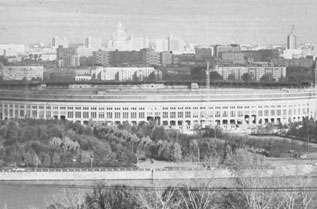 The IOC is a "self-recruiting" body, members are invited onto the committee and until 1966 remained on for life - since then those appointed serve until they reach the age of 72, but those appointed prior to then serve until death. There is one member in his nineties. The IOC is the governing body of the Olympic movement. It makes the rules, determines elegibility, decides where the games should take place and under what conditions. It is responsible to nobody but itself and is keenly jealous of its exclusive jurisdiction over the games. There is now an assembly of the national olympic committees and conferences of sports federations, but these have merely advisory roles and indeed Killanin's immediate predecessor in the Presidency, the irascible Avery Brundage, who served from 1952 to 1972, deeply resented the very existence of these bodies.
The IOC is a "self-recruiting" body, members are invited onto the committee and until 1966 remained on for life - since then those appointed serve until they reach the age of 72, but those appointed prior to then serve until death. There is one member in his nineties. The IOC is the governing body of the Olympic movement. It makes the rules, determines elegibility, decides where the games should take place and under what conditions. It is responsible to nobody but itself and is keenly jealous of its exclusive jurisdiction over the games. There is now an assembly of the national olympic committees and conferences of sports federations, but these have merely advisory roles and indeed Killanin's immediate predecessor in the Presidency, the irascible Avery Brundage, who served from 1952 to 1972, deeply resented the very existence of these bodies.
The Brundage Presidency was almost entirely autocratic, Killanin has tried to quietly democratise the organisation, although he too is opposed to having the IOC elected other than by itself. He has however brought on a younger element, he has ensured that most countries and regions of the world are adequately represented and the criterion of wealth is no longer applicable, although there are no impoverished members of the IOC.
Killanin has even talked about bringing women onto the IOC, although the criteria he has set for such a move would suggest that it is unlikely to occur in the forseeable future. Charges of male chauvinism against the IOC have been levelled for a long time - they were vigorously opposed initially to the participation of women the games.
Killanin has also eased the rules on amateurism within the movement. In conformity with its aristocratic character, the IOC rigorously enforced a strict amateur ruling which meant that it was difficult for poorer athletes to compete with wealthy ones who could afford time off and superior facilities. The new rules legitimise "split-time" athletes - who are subsidised either by the state or private enterprises while they train.
He was pitched into the maelstrom in the Montreal games in 1976 when the African states refused to participate because of New Zealand's association with the South African Springbok rugby team. Then the Trudeau Government refused to admit the Taiwanese delegation who wanted to fly the nationalist Chinese flag and play that anthem. Delicate negotiations between Killanin and Trudeau eventually resolved that difficulty and the Irish peer was also responsible for Queen Elizabeth opening the games in Montreal in French, thus defusing the explosive Quebec nationalist issue.
Killanin's greatest triumph to date has been the successful negotiation of The People's Republic of China's participation in the games. He did so by according simultaneous recognition to the Peking national Olympic Committee and the Taipeh national Olympic Committee. Difficulties have persisted with the Taiwanese however because the IOC has insisted that they no longer fly the nationalist China flag or play the anthem.
Anthems and flags have long been the bug-bear of the Olympic movement and in fact have represented a contradiction within the organisation which stresses that the games are a competition between individuals, not between nations. Killanin has for several years attempted to have anthems and flags removed entirely from the games but without success - the great powers want to retain them as symbols of their superiority and the new nations want them as an assertion of their newly acquired identities.
Killanin's jocular easy going disposition has been a very necessary antidote to the abrasiveness of Brundage's Presidency. Killanin has a deceptive command of the intricacies of the most complex issue, he is respected throughout the movement and pressures are mounting on him to stand for re-election again in Moscow, if not for a further four years at least for two.
When the International Olympic Committee decided to give the games to Moscow, in preference to Los Angeles, at its annual session in Vienna in 1974, thoughts of Afghanistan didn't enter anybody's mind. Instead there were worries about Soviet willingness to allow Israel to participate and there were some reservations about the consequences of a Soviet clamp-down on dissidents immediately prior to the games.
However a clear majority of IOC members believed it was time that the communist world, which had come into the games only in 1952, was given an opportunity to host the Olympics and Moscow seemed to have the range of facilities needed to stage them.
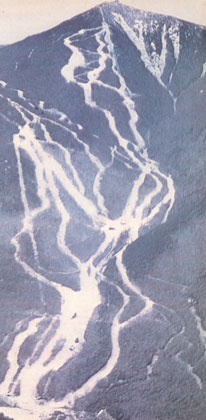 Their predecessors have been castigated for giving the Games to Nazi Germany in 1936 which is unfair. The IOC met in 1932 before Hitler got to power; they were asked to pull them out as President Carter and Mrs. Thatcher are now exhorting them to remove from Moscow. The IOC of 1930's declined; Avery Brundage, who was to become one of the most famous presidents of the movement lead the opposition to the zionist groups in the States who wanted to be out. The President of the IOC, Henri Baillet Latour told Hitler to take down the notices outside the toilets at Garmistch Partenkirchen the site of the winter Olympics which said "Pigs and Jews not allowed". Hitler told him that he should not tell people what to do in their own home to which the gentle president pointed out to the chancellor that this was not Germany during the Olympic Games, the country belonged to the Olympic Movement. The signs were removed.
Their predecessors have been castigated for giving the Games to Nazi Germany in 1936 which is unfair. The IOC met in 1932 before Hitler got to power; they were asked to pull them out as President Carter and Mrs. Thatcher are now exhorting them to remove from Moscow. The IOC of 1930's declined; Avery Brundage, who was to become one of the most famous presidents of the movement lead the opposition to the zionist groups in the States who wanted to be out. The President of the IOC, Henri Baillet Latour told Hitler to take down the notices outside the toilets at Garmistch Partenkirchen the site of the winter Olympics which said "Pigs and Jews not allowed". Hitler told him that he should not tell people what to do in their own home to which the gentle president pointed out to the chancellor that this was not Germany during the Olympic Games, the country belonged to the Olympic Movement. The signs were removed.
Forty odd years on it's a nice little piece of Olympic history amidst all pictures of the Berlin Games with their Nazi flags and modem sporting equipment. It can only be a matter of conjecture of course but having the Games in Berlin did bring to that city a large number of influential people who would not otherwise have seen the Nazi movement at close hand. There was of course no television of the Games in those days. Did Hitler's sporting show alert a small part of the world to what was really coming? Without the Games might not Chamberlain have waved the piece of paper and announced peace in our time in 1940 rather than 1939, by which time Hitler's nuclear scientists would have been that much further ahead? We shall never know of course but Berlin 1936 might have been a great Olympic Victory rather than an Olympic disgrace.
Since then, and before, the Olympic arena has been a place for political expression. Surely there was no other reason for using Antwerp, virtually the centre of World War I, for the Olympic Games of 1920. It was a response to the war lords, a memorial to the dead, but it was an expression, a response to an event which had interrupted the ideal of Baron Pierre de Coubertin.
Those who remember will tell you that the best period of the Games was from 1948 to 1952. London with its utility marks and ration books, welcomed that part of the weary world which could manage it and was, like Germany, not in disgrace in 1948. Four years later Helsinki, the home of Nurmi, who carried the torch into the arena, produced the friendly Games amidst those fresh pine forests. It was the end of an era.
After that the purists found it all going wrong. The rape of Budapest in 1956 was reflected in the bloody water of the polo pool in Melbourne when Hungary played Soviet Union; the problems of getting East and West Germany together - as one team; the shootings of the innocent Mexicans just before the opening of the 1968 Games; the black power demonstrations there. Then in 1972 murder in the Olympic Village of the Israeli competitors.
In all this time, since 1960 onwards the Games have become enormous; the number of countries has doubled, the number of competitors, the number of sports has gone up and the events in those sports. Each Olympic city tries to outdo the previous one in facilities with a resounding rise in costs as more sophisticated technical equipment becomes necessary. By 1976 it was not so much politics as corruption which blighted the Games as the costs of Montreal rocketed to a thousand million dollars.
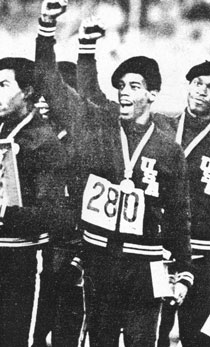 Since 1960 the growth of the Games has been due almost entirely to television, first around Europe and then by satellite around the world. No other event commands such a television audience around the world. Every four years the world stops work and draws up an armchair for two weeks to watch the world's top sportsmen. It is because of this fact that commercial, and political interests get on the Olympic platform to demonstrate their wares.
Since 1960 the growth of the Games has been due almost entirely to television, first around Europe and then by satellite around the world. No other event commands such a television audience around the world. Every four years the world stops work and draws up an armchair for two weeks to watch the world's top sportsmen. It is because of this fact that commercial, and political interests get on the Olympic platform to demonstrate their wares.
Never before however has politics entered the Olympic arena so overtly. President Carter is currently attempting to use a boycott of the games as a retaliatory gesture against the Soviet Union, not because of anything related to the games but because of an entirely unrelated, however significant event - the invasion of Afghanistan.
The political climate in the United States is such that it will be very difficult for the President to withdraw from this stance, however isolated America might transpire to be in such a boycott. The question really is if the authority of his call for a boycott can be undermined by events and outside pressures to permit American athletes to attend - it is this equation that a jolly, shrewd Irish peer contemplates amid his books and memorablia in Lansdowne Road.
The whole concept of the Olympics is due to come up for discussion at the International Olympic Congress next year in Baden Baden. There the role and composition of the IOC is likely to be hotly debated as well as the question of professionalism, the issue of "giganticism" (the unwieldly size of the games), the issue of flags and anthems and the intruding political issues. Killanin is being pressed to remain on as President to chair this gathering which will be comprised not just of the 89 IOC members but delegates from each of the national Olympic committees and from the various sports federations.
For many reasons the Olympic Games are unlikely to be the same after Moscow '80.
America Can't Wreck the Olympics
Actually an American boycott of the games would not be that calamitious for they offer first rate competition in few events outside swimming, basketball, water polo, rowing, wrestling, shooting and weightlifting.
American talent in the glamour events, athletics, gymnastics is not that formidable and their absence from these events would not be crucial. Nevertheless some American athletes of outstanding merit would be lost to the games if there was a complete boycott by the United States team. Missing would be:
Edwin Moses: the Olympic 400 metres hurdles champion and world
record holder.
James Robenson: tipped to get among the medals in the 800 metres.
James Sandford: the second fastest runner over 100 metres in the world last year.
James Mallard: the second fastest in the 200 metres in the world last year.
Steve Scott: a challenger for a medal in the hotly contested 1500 glamour event in which Sebastian Coe, Steve Ovett, Eamon Coghlan and John Walker are expected to be the major contenders.
Bill Rodgers: the world's fastest marathon runner last year.
Renaldo Nehemiah: the world record holder in the 110 metres hurdles.
Larry Myricks: one of the favourites in the long jump.
Mac Wilkins: the 1976 discus champion.
Craig Virgin: the second fastest 10,000 metres runner last year.
Rudi Chappa: tipped to do well in the 5000 metres.
Debi La Plante: tipped to do well in the 100 metres hurdles.
Evelyn Ashford: the discovery in the 100 metre sprints who was expected to challenge the East German domination in the event.
Kate Schmidt: in with a chance in the javelin
